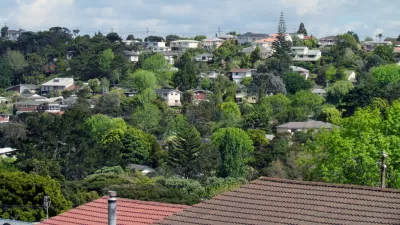After investing more than $1 billion in buying homes over the last few years, Zillow has ended its 'iBuying' experiment as anticipated profits fail to materialize.

Kim Velsey assesses Zillow's failed 'iBuying' experiment, a $1-billion venture that saw the real estate giant buying thousands of homes using algorithm-based decisions in the hopes of flipping them for a profit. In the latest twist in the saga, the company has now suspended the program, which did not accurately predict house value appreciation.
According to Zillow chief executive Rich Barton, "the unpredictability in forecasting home prices far exceeds what [the company] anticipated," making the program a much riskier investment than previously thought. Its aggressive buying algorithms led to the company overpaying for properties, Velsey says, while materials shortages and price spikes made renovations more expensive. Consequently, "flips became flops: Zillow listed 66 percent of homes for prices below what it paid for them, with an average discount of 4.5 percent, according to an analysis of 650 Zillow homes by KeyBanc Capital markets," writes Velsey.
Zillow's biggest mistake, argues Velsey, "was not realizing that as much as people love house hunting on Zillow, when it comes to actually buying and selling properties, real estate remains very much an in-person business." Although housing prices continue to rise and automation is gaining steam in other industries, it is unclear that real estate buyers and sellers are unhappy with the traditional model.
FULL STORY: Why Did So Many Homeowners Sell to Zillow? Because It Overpaid.

Maui's Vacation Rental Debate Turns Ugly
Verbal attacks, misinformation campaigns and fistfights plague a high-stakes debate to convert thousands of vacation rentals into long-term housing.

Planetizen Federal Action Tracker
A weekly monitor of how Trump’s orders and actions are impacting planners and planning in America.

San Francisco Suspends Traffic Calming Amidst Record Deaths
Citing “a challenging fiscal landscape,” the city will cease the program on the heels of 42 traffic deaths, including 24 pedestrians.

Adaptive Reuse Will Create Housing in a Suburban Texas Strip Mall
A developer is reimagining a strip mall property as a mixed-use complex with housing and retail.

Study: Anti-Homelessness Laws Don’t Work
Research shows that punitive measures that criminalized unhoused people don’t help reduce homelessness.

In U.S., Urban Gondolas Face Uphill Battle
Cities in Latin America and Europe have embraced aerial transitways — AKA gondolas — as sustainable, convenient urban transport, especially in tricky geographies. American cities have yet to catch up.
Urban Design for Planners 1: Software Tools
This six-course series explores essential urban design concepts using open source software and equips planners with the tools they need to participate fully in the urban design process.
Planning for Universal Design
Learn the tools for implementing Universal Design in planning regulations.
Heyer Gruel & Associates PA
JM Goldson LLC
Custer County Colorado
City of Camden Redevelopment Agency
City of Astoria
Transportation Research & Education Center (TREC) at Portland State University
Jefferson Parish Government
Camden Redevelopment Agency
City of Claremont





























